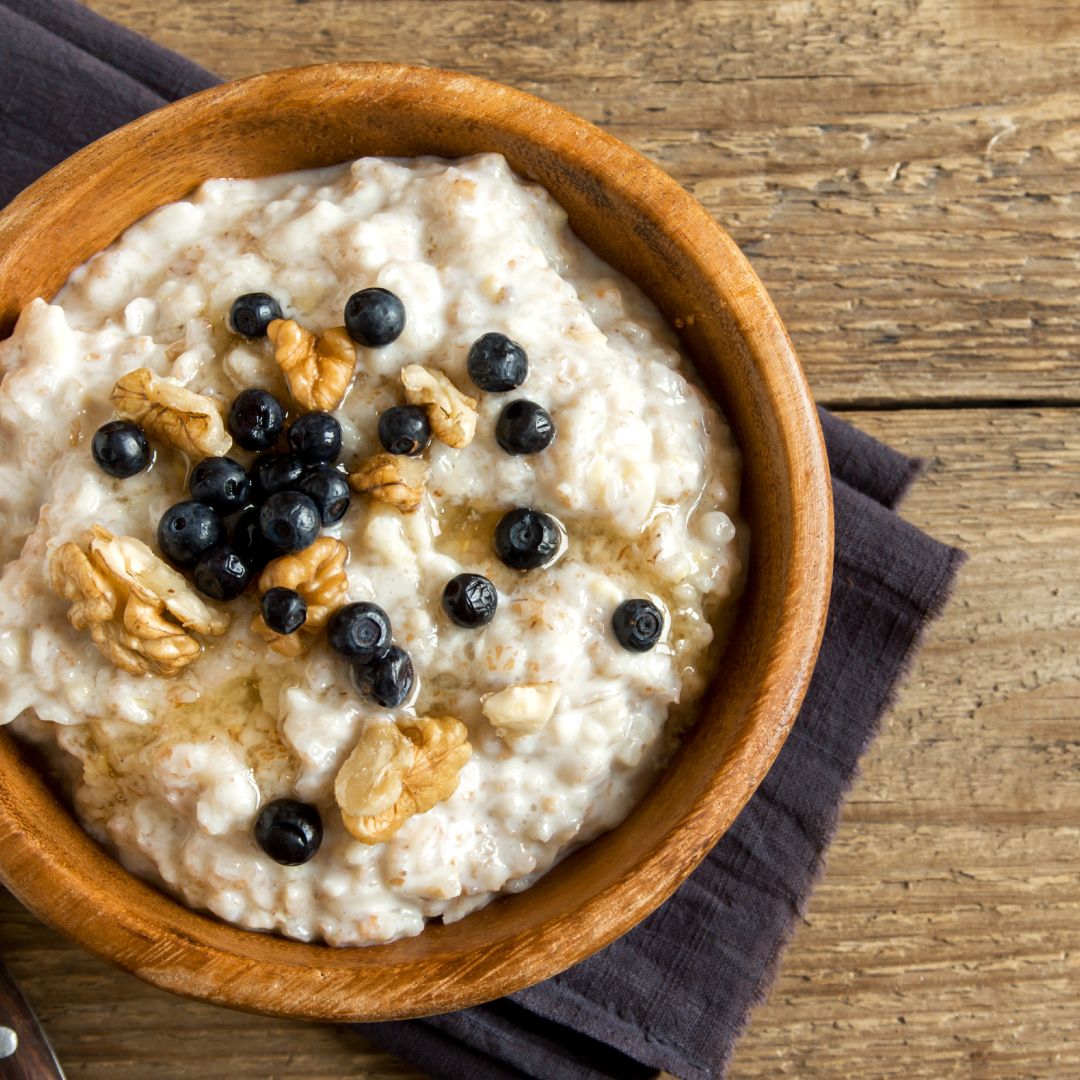
Top Tips: Heart Healthy Swaps for PCOS
If you have PCOS and have been told your cholesterol is “a bit high”, or you are worried about long-term heart health, you are not overreacting. PCOS is not just about periods or fertility. For many women, it overlaps with insulin resistance, inflammation and changes in lipid metabolism, all of which can influence cardiovascular risk over time.
The aim of this blog is not perfection. It is about small, realistic food swaps that add up. These changes are especially helpful in PCOS because they support both cardiometabolic health and the underlying drivers of symptoms.
Why small swaps matter in PCOS
In PCOS, heart health is often shaped by the bigger pattern, not one “bad” food. When insulin levels are running high, the body may be more likely to show a classic pattern on blood tests: higher triglycerides, lower HDL cholesterol, and changes in LDL-related risk. This is one reason the 2023 international PCOS guidelines highlight having regular assessment of cardiometabolic risk factors, such as lipids and blood pressure.
Practical heart-healthy changes for daily meals:
When we talk about fats and heart health, the conversation often becomes overly simplistic. Saturated fat is frequently grouped together as something to avoid, but the evidence does not support treating all saturated fats as equal.
Whole-food fats such as butter, ghee and coconut oil have been part of traditional diets for generations and are chemically stable, particularly at higher cooking temperatures. In contrast, the strongest evidence of harm relates to industrial trans fats and highly processed sources of saturated fat, such as those found in commercially baked goods, pastries, deep-fried foods and processed meats.
In PCOS, this distinction matters. Many women are already dealing with insulin resistance and inflammation, and diets high in ultra-processed foods are consistently associated with poorer cardiometabolic outcomes.
Rather than eliminating traditional fats, a more practical and evidence-informed approach is to:
Research suggests that replacing ultra-processed fats with whole-food fat sources, alongside improving overall diet quality, is more relevant for cardiovascular risk than focusing on saturated fat intake in isolation.
For women with PCOS, this approach also supports satiety, blood sugar stability and hormonal balance, which indirectly influences cholesterol markers, triglycerides and inflammation over time.
Many women with PCOS are trying to “eat healthily” but still end up with meals that are low in protein and fibre, which can worsen cravings later.
A simple template is: protein + vegetables + fibre. For example, a shop-bought sandwich and crisps can become a grain bowl, soup plus chicken, or leftovers with added salad, seeds and olive oil.
This matters because triglycerides and HDL cholesterol are often influenced by overall meal structure and blood sugar stability. It is also relevant for ApoB, as higher triglycerides can be a clue that particle-based risk markers may be worth checking.
Fibre supports gut health, blood sugar regulation and lipid balance, all of which matter in PCOS.
Soluble fibre is particularly helpful for cholesterol. A 2023 dose-response meta-analysis of randomised controlled trials found that each additional 5g per day of soluble fibre supplementation reduced LDL cholesterol by about 5.6 mg/dL.
Food-first sources include oats, barley, beans and lentils, ground flaxseed, chia, apples, citrus, carrots and psyllium. If you are prone to bloating, build slowly and pair fibre with adequate fluids.
You do not need to stop eating meat to support heart health, but reducing processed meats is a sensible evidence-based shift.
Oily fish is particularly useful in PCOS because omega-3 fats support inflammatory balance and triglyceride metabolism, and they complement a Mediterranean-style pattern.
If you do not enjoy fish, swapping in beans and lentils still supports fibre intake and cardiometabolic health.
Ultra-processed foods are consistently linked with poorer cardiometabolic outcomes at a population level, including cardiovascular disease risk.
A practical swap is to build snacks, when you need them, around protein, fibre and healthy fats together. This can help reduce the blood sugar swings that often drive afternoon crashes, cravings and mood dips in PCOS.
Blood pressure is an important piece of cardiovascular risk in PCOS, and it is not only about salt.
A DASH-style dietary pattern has been shown in randomised controlled trial meta-analyses to reduce blood pressure in adults with and without hypertension.
In day-to-day life, this looks like more vegetables, fruit, legumes, nuts, seeds and minimally processed foods, while reducing ultra-processed foods that often contribute the most sodium.
If you have kidney disease or take medications that affect potassium, always check with your GP before significantly increasing potassium-rich foods.
This is the swap that matters most.
PCOS can come with a long history of diet pressure and black-and-white thinking. For heart health, the goal is to create a pattern you can repeat week to week. That is how you reduce risk over time, whether your main concern is LDL cholesterol, triglycerides, ApoB-related particle burden, or inherited markers like Lp(a).
If you would like help choosing the two or three swaps that will make the biggest difference for your results and symptoms, why not book in a call to chat to us further.
Short disclaimer
This blog is for educational purposes only and is not medical advice. As a BANT-registered Nutritional Therapist, I do not diagnose or treat medical conditions and I do not advise on prescription medications. If you have concerns about cholesterol, blood pressure, cardiovascular risk or blood test results, please speak with your GP or relevant medical specialist.

If you have PCOS and you have ever been told you are “too young” to think about heart health, think again.
PCOS is often framed as a fertility or period issue, but it is actually a lifelong metabolic and inflammatory condition. This is important to understand, as the metabolic drivers that sit underneath PCOS, particularly insulin resistance, abdominal weight, and chronic low-grade inflammation, can affect cardiovascular health over time.
The good news is that you can do a lot to support your long-term risk, especially when you understand which markers matter and what your results actually mean.
In this blog, I will cover:
Why cardiovascular risk is higher in PCOS
Over the past few years, higher-quality research has strengthened the evidence that women with PCOS have a higher risk of cardiovascular disease over the long term compared with women without PCOS (by a staggering 47-68% depending on the study).
It is important to say this clearly and calmly. Higher risk does not mean heart disease is inevitable. It means PCOS is a reason to take prevention seriously, earlier, and with a focus on the underlying drivers rather than quick fixes.
The 2023 International Guidelines for PCOS reflect this – they recommend awareness of cardiovascular risk in PCOS and highlights the importance of regular assessment of cardiometabolic risk factors such as blood pressure and lipids.
So, what is driving that increased risk?
The role of insulin resistance and inflammation
For many women, insulin resistance is one of the central features of PCOS. When insulin levels remain higher for longer, this can influence cardiovascular risk in several ways, including changes in lipid metabolism (cholesterol levels), higher triglycerides, lower HDL cholesterol, and a tendency towards a more atherogenic lipid profile – meaning a higher risk of cardiovascular disease.
Chronic low-grade inflammation is also common in PCOS, particularly when insulin resistance, poor sleep, chronic stress or central weight gain are present. Inflammation can damage the lining of blood vessels which can lead to a greater risk of heart disease. This is one reason heart health is about more than cholesterol alone.
Cholesterol, blood pressure and PCOS
In practice, the most common cardiovascular markers that come up in PCOS include:
The PCOS guidelines recommend that all women with PCOS have blood pressure measured at least annually. Cholesterol testing is also recommended, with follow-up frequency based on results and overall risk.
Cholesterol explained: what it is and what the markers mean
Cholesterol is a waxy, fat-like substance that your body uses to build cell membranes, make vitamin D, and produce hormones and bile acids. It is super important for your wellbeing! Your liver makes most of the cholesterol you need, and you also get a small amount from food.
Cholesterol only becomes a problem when cholesterol-containing particles build up in artery walls over time, contributing to atherosclerosis (narrowing and hardening of the arteries). This process is influenced by many things - including blood pressure, blood sugar balance, inflammation, smoking, genetics, hormone balance, stress, sleep and how much exercise you do.
What is a lipid profile actually measuring?
A standard lipid profile usually includes:
Why “LDL cholesterol” is not the whole story
LDL cholesterol tells you how much cholesterol is being carried inside LDL particles. But it does not tell you how many particles are carrying it.
This matters because atherosclerosis is driven by the number of atherogenic particles entering the artery wall. Two people can have the same LDL cholesterol but a very different number of LDL particles. This is one reason why measuring something called ApoB can actually be more helpful in ascertaining your risk of heart disease.
ApoB: the marker that helps you understand what’s going on
Apolipoprotein B (ApoB) is a protein found on the surface of atherogenic lipoproteins (including LDL, VLDL and remnants), ie the cholesterol carriers that may lead to heart disease. Each particle carries one ApoB, so ApoB is effectively a count of the number of “risk-carrying” particles.
Recent reviews and expert consensus documents have highlighted ApoB as a strong predictor of cardiovascular risk, particularly in people with insulin resistance, obesity, metabolic syndrome or higher triglycerides.
How is ApoB linked to PCOS?
PCOS is commonly associated with insulin resistance and altered lipid metabolism. Emerging research suggests ApoB-related particle patterns may be relevant in PCOS, especially where triglycerides are higher or weight gain is present, although larger studies are still needed.
The practical take-home is that ApoB can sometimes help clarify risk when standard cholesterol results do not match the rest of the clinical picture.
ApoB levels can be measured in a simple blood test. It is not always part of routine NHS lipid testing, but it can be requested in some settings. This is something you can request from your GP, or there are many private labs that offer this measurement. If this is something that you’d like to look at, please do get in touch as this is something that I can potentially help with.
Lp(a): a genetic risk factor worth knowing about
Lipoprotein(a), written as Lp(a), is an LDL-like particle with an additional protein attached (apolipoprotein(a)). Lp(a) is largely genetic and remains fairly stable across your lifetime.
However, elevated Lp(a) is now recognised as an independent risk factor for cardiovascular disease. It can contribute to risk even when other cholesterol markers look “fine”. European guidance and consensus documents support measuring Lp(a) at least once in adulthood, to identify inherited elevation and refine risk assessment.
Research shows that high Lp(a) increases heart disease risk by acting like "sticky" LDL cholesterol, promoting plaque buildup (atherosclerosis) and blood clots in arteries, potentially leading to heart attacks and strokes, even with normal cholesterol. This is because its unique protein (Apo(a)) hinders plaque breakdown and encourages clot formation. This genetic factor causes more aggressive plaque, calcification, and inflammation, independently raising cardiovascular danger, especially with other risk factors present.
A 2023 systematic review and meta-analysis found that women with PCOS had higher Lp(a) levels compared with controls, including in both overweight and non-overweight women.
This does not mean every woman with PCOS will have high Lp(a). It means Lp(a) is one of the markers that may be relevant for some women, particularly those with a family history of early cardiovascular disease.
How do you test Lp(a)?
Lp(a) is also tested with a simple blood test. Like ApoB, it is not routinely included in standard lipid panels.
A helpful approach is to ask your GP whether Lp(a) testing is appropriate for you, especially if you have:
Lp(a) can be reported in different units (mg/dL or nmol/L), and results should be interpreted accordingly. Many clinical sources use approximately 50 mg/dL or 125 nmol/L as a threshold associated with higher risk, but your overall clinical picture matters.
Because Lp(a) is genetic, lifestyle changes tend not to shift the number very much. The focus is usually on lowering overall risk by improving other modifiable factors (LDL cholesterol, blood pressure, blood sugar, inflammation, smoking status, fitness, sleep).
Specialist medications specifically targeting Lp(a) are under investigation, but lifestyle still matters because it reduces the total risk burden.
Blood pressure and PCOS: an often-overlooked risk factor
Blood pressure is one of the most important and modifiable cardiovascular risk factors, yet it is often under-discussed in PCOS, particularly in younger women.
Evidence from large observational studies and recent systematic reviews shows that women with PCOS have a higher prevalence of elevated blood pressure and hypertension compared with women without PCOS, even after adjusting for body weight. This suggests that PCOS itself, not just weight, contributes to blood pressure dysregulation.
Several mechanisms appear to be involved. Insulin resistance plays a central role, as higher circulating insulin levels promote sodium retention in the kidneys and increase sympathetic nervous system activity, both of which raise blood pressure. Chronic low-grade inflammation and endothelial dysfunction, which are common in PCOS, also reduce the ability of blood vessels to relax appropriately.
Hormonal factors may contribute as well. Elevated androgens have been associated with higher blood pressure in women with PCOS, and emerging research suggests that altered renin–angiotensin signalling may further influence vascular tone in this population.
Importantly, raised blood pressure in PCOS can occur even when readings are only mildly elevated or fluctuate between normal and borderline ranges. These early changes still matter. Long-term data show that cumulative exposure to higher blood pressure over time is strongly associated with cardiovascular risk later in life.
What this means in practice
The current international PCOS guideline recommends that all women with PCOS have their blood pressure checked at least annually, regardless of age. This is a key prevention step, not an indication that something is already wrong.
From a nutrition and lifestyle perspective, blood pressure in PCOS often responds well to the same foundations that support insulin sensitivity and inflammation balance. Dietary patterns rich in vegetables, fruit, legumes, wholegrains, nuts and seeds are consistently associated with lower blood pressure, while high intakes of ultra-processed foods are linked to higher readings.

The Power of Small Changes
Many people begin January believing they need major changes to manage PCOS. It is easy to feel pressure to overhaul your whole lifestyle or follow restrictive plans that feel unsustainable. But the truth is that small, consistent actions often make the biggest difference. These gradual steps are easier to maintain and can support more stable energy, steadier appetite and an overall sense of greater control.
The following case studies help to show how simple changes helped three women begin to feel more balanced and confident in their routines. Each story reflects something I see often in practice: real progress begins with changes that fit the individual, rather than trying to force a perfect plan.
Why small changes make the biggest difference
PCOS can feel overwhelming because it touches so many areas of our life. When everything feels so intertwined, it is tempting to think you need a complete and utter reset. Yet research consistently shows that sustainable, moderate lifestyle adjustments can be more impactful than extreme diets or intense exercise plans.
Small changes work because:
These changes accumulate over time, creating momentum that feels manageable rather than stressful. For many women, this gentle approach makes PCOS feel far less intimidating.
Case study 1: Balancing blood sugar
Amira started the year feeling tired most mornings and often found herself searching for snacks by mid-afternoon. She had tried cutting out entire food groups in the past, but nothing seemed to stick. Instead of another strict plan, she chose one simple goal. She added protein to her breakfast each day.
She began making a balanced morning meal with oats, seeds, berries and a good source of protein. After a few weeks, she noticed she felt fuller for longer and more stable through the morning. Her energy was more consistent, and she felt more confident approaching the rest of her meals with the same balanced mindset.
A single daily habit had a ripple effect on her routine, making eating feel calmer and more predictable.
Case study 2: Adding movement gradually
Claire wanted to exercise more but felt overwhelmed by the idea of committing to long workouts. In the past, she would start an ambitious routine, stick with it for a week or two, then stop when life became busy or she didn’t have the energy to continue such a massive plan.
This time she focused on one achievable goal. She added a 10-minute walk after lunch on weekdays. It felt manageable and didn’t require any special planning. As her confidence grew, she extended a couple of walks and added gentle strength work twice a week.
Within a month, movement felt less like a chore and more like a positive part of her day. The steady routine supported her mood, energy and sense of wellbeing without the pressure of a strict programme.
Case study 3: Supporting gut health
Sofia had always struggled with digestive discomfort, which often left her feeling bloated and unsure about which foods worked best for her. Instead of cutting out several foods at once, she explored adding more fibre in a gentle, consistent way.
She began by including a portion of vegetables with lunch and dinner, then added ground flaxseed to her breakfast a few mornings a week. After a few weeks her digestion felt more regular, mealtimes felt easier and she had a clearer sense of what supported her body.
Supporting gut health did not require a major overhaul. Small additions created meaningful progress.
What you can take from these stories
Each of these women started with just one change. None of them relied on strict rules or dramatic plans. They each chose something realistic, repeatable and supportive of their goals.
You might begin by:
The most effective approach is the one that feels manageable for you. Progress with PCOS rarely comes from perfection. It comes from steady steps that you can keep returning to, even during busy or stressful times.
If you feel unsure about where to begin, you are not alone. A personalised plan that fits your lifestyle can make the process feel far more achievable and grounding. You don’t need drastic changes, just the right ones. Book a free call with us to see how you could start your own PCOS progress story.

PCOS Power Porridge
A warm bowl of porridge can feel grounding and comforting on cold winter mornings, especially when the weather is icy and you need something nourishing before the day gets busy. For many people with PCOS, starting the day with a balanced breakfast that combines protein, fibre and healthy fats can help support steadier energy and appetite through the morning.
Traditional porridge made only with oats can sometimes lead to a sharper rise in blood sugar. This PCOS Power Porridge is a more balanced version that blends oats with flaxseed, chia and hemp seeds for added fibre and texture. It also includes a protein option that brings the meal to at least 30 g protein, which can help support fullness and reduce the likelihood of mid-morning energy dips.
Why this porridge works well for PCOS
Oats are naturally rich in beta glucans, a type of soluble fibre that slows digestion and supports a more gradual rise in blood glucose. When paired with additional fibre from seeds, healthy fats from nuts and a meaningful amount of protein, they create a breakfast that helps keep you satisfied and energised for longer.
For people managing PCOS, meals that combine fibre and protein can support more stable hunger patterns and make it easier to maintain balanced eating through the day. This recipe provides more than 10 g fibre and more than 30 g protein, all in a warm and comforting bowl.
Serves: 1
Dry ingredients
Protein options (choose one)
All options bring the recipe to at least 30 g protein.
Option A: Balanced and best tasting
Option B: Higher protein, no yoghurt
Option C: No protein powder
Liquid
Toppings
Method
Flavour variations
Blueberry and Lemon
Stir through frozen blueberries while cooking and finish with lemon zest.
Cocoa and Almond
Add a teaspoon of cocoa powder before cooking and top with chopped almonds.
Ginger and Pear
Add chopped pear and a little ground ginger for a warming winter flavour.
Serving suggestions and storage tips
Make ahead
Combine the dry ingredients in a jar so breakfast is quick to prepare on busy mornings.
Storage
Cooked porridge keeps for up to two days in the fridge. Add a splash of liquid when reheating.

My Top 5 Easy Food Swaps
January often brings so much pressure to overhaul everything all at once. Many of us feel pulled towards strict plans or quick fixes, especially after a busy – and heavy! - December. But the problem is that those restrictive diets rarely last long, and then often leave us feeling hungry, tired and frustrated. And there is soooo much targeted at people with PCOS – it can feel overwhelming.
Gentle food swaps offer a different way forward. They are easy changes that can support better energy, steadier appetite, and a more nourishing routine without cutting out entire food groups. These small changes can help you feel nourished rather than deprived. Plus, they are far easier to maintain in the long term.
Why Gentle Swaps Work Better than Diets
Research shows that nutrition habits that last tend to come from gradual changes rather than all-or-nothing rules. When you focus on adding nourishing foods rather than removing everything you enjoy, your meals feel satisfying and your blood sugar and energy levels often benefit.
Gentle swaps support your metabolism by increasing the amount of fibre, protein or healthy fats in your meals. These nutrients help with satiety, stabilise blood sugar and support digestive health. Over time these small choices add up and create a meaningful shift in how you feel day to day.
They also reduce the sense of pressure that often leads to diet fatigue. By making manageable changes at your own pace, it becomes easier to build confidence and consistency.
5 Practical Food Swaps for Everyday Meals
These swaps are simple, realistic and easy to put into action.
1. Swap toast for a protein-based option such as oatcakes with cottage cheese or eggs with veggies
This reduces reliance on fast-releasing carbohydrates and increases protein and fibre which help keep blood sugar steadier. Oatcakes, cottage cheese and eggs all offer slow and sustained energy while still feeling satisfying and comforting.
2. Swap sugary breakfast cereals for a protein rich start
Many cereals create a quick rise in blood sugar followed by a mid-morning slump. Choosing Greek yoghurt with nuts and seeds, eggs, if tolerated, or a warm porridge with added protein can keep you energised and satisfied (see this month’s Power Porridge recipe)
3. Swap creamy sauces for yoghurt based or olive oil dressings
Plain yoghurt, tahini and olive oil provide a creamy texture with more protein or healthy fats and usually less added sugar. These options help support balanced meals and provide a gentler release of energy.
4. Swap crisps or biscuits for balanced snacks
If you need a snack, choose options that pair protein and fibre. Think snacks like hummus with vegetables, nuts with fruit, or Greek yoghurt with berries. These combinations support fullness and reduce cravings without feeling restrictive.
5. Swap processed meats for lean or plant-based proteins
Choosing fish, poultry, tofu, tempeh or beans if tolerated can provide higher quality protein and more fibre or omega 3 fats. These foods support metabolic health and promote a steadier release of energy throughout the day.
Breakfast Upgrade Ideas
If your breakfast is an area that you’d like to refresh, try one of the following:
• Power porridge with chia and flaxseeds, and protein powder
• Greek yoghurt with berries, nuts and seeds
• A vegetable packed omelette or tofu scramble
• Oatcakes topped with nut butter and sliced fruit
Each of these options supports more balanced blood sugar responses which can help reduce mid-morning cravings.
If you want support creating realistic habits that feel good and last beyond January, why not book a free call to see how nutritional therapy could help you feel more energised and confident with your eating.

Why Detox Diets Don’t Work for PCOS
What are detox diets?
January often brings a wave of “detox” plans that promise a reset after the festive season. These diets usually involve cutting out major food groups, drinking juices or smoothies in place of meals, or following stupidly strict rules for a short period of time. They’re often marketed as a way to “cleanse” the body, balance hormones or kickstart weight loss.
For someone living with PCOS, these messages can feel especially tempting. When symptoms feel unpredictable or you’ve tried countless plans without lasting change, the idea of a quick fix can feel hopeful.
But while detox diets are persuasive, the evidence behind them is very limited. And for many people with PCOS, they may do more harm than good.
Why detoxes don’t work for PCOS
The idea that the body needs an external detox is not supported by research. If your liver, kidneys and digestive system are functioning normally, they’re already working continuously to break down and remove toxins without the need for special diets or supplements.
There’s also no reliable evidence showing that detox diets improve key PCOS concerns such as insulin resistance, androgen levels, ovulation or inflammation. Some detox products can even be problematic, with reports of liver stress linked to certain herbal cleanse supplements.
What’s more, many detoxes rely on severe restriction. They may lead to rapid short-term changes on the scales, but they don’t address the metabolic drivers of PCOS and don’t support long-term hormone balance. This often leaves people feeling like they’ve “failed” another plan when, in reality, it was never designed for sustainable success in the first place.
The impact of restriction on hormones and metabolism
Most clients I work with have been told at some point that they need to be stricter or try harder, that it’s their fault they’re in the position they are. Yet restrictive diets massively place the body under additional stress. For example:
For people with PCOS, whose bodies may already be working against insulin resistance or inflammation, this kind of disruption can feel especially challenging.
Many women tell me they blame themselves when a restrictive plan isn’t sustainable. But the issue isn’t you. It’s the approach. Restriction may work temporarily, but it isn’t a long-term strategy for supporting hormones, metabolism or overall wellbeing.
What actually supports detoxification in the body
Although detox diets aren’t necessary, we can support the body’s natural detoxification pathways through balanced, consistent habits. These are gentle, realistic shifts rather than extremes.
Examples include:
These everyday foundations create a more stable internal environment for hormone regulation than any short-term cleanse.
Better long-term strategies for PCOS
Most people with PCOS don’t need another rigid diet. They need clarity, reassurance and a plan that feels doable even on the busiest weeks. Long-term progress comes from repeatable habits, not restriction.
Sustainable strategies include:
And importantly, working with your body rather than fighting against it.
You’re not expected to figure all this out alone. Many people come to me feeling overwhelmed or frustrated after trying countless plans. Once we simplify things and build a strategy that suits their life, the process becomes far more manageable and far less stressful.
If detox diets have left you feeling discouraged in the past, please know that it’s not a lack of willpower. It’s simply that restrictive approaches aren’t designed for long-term success in PCOS. Small, consistent habits are far more powerful. And if you’re ready to move beyond quick fixes? Why not book a free consultation with us, where we can look at how to build a sustainable PCOS plan that works for you.